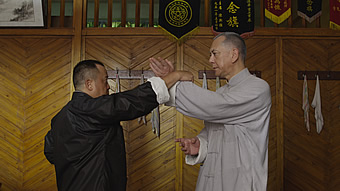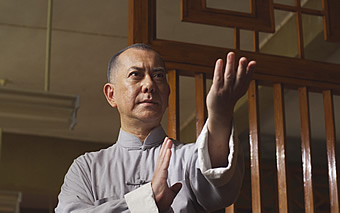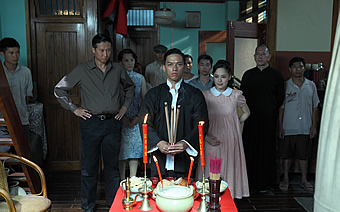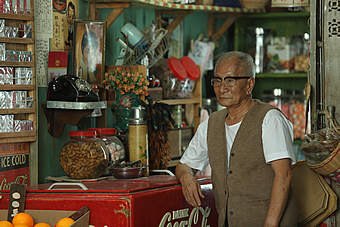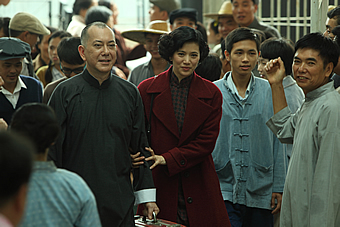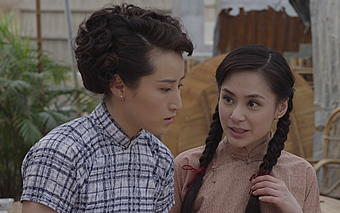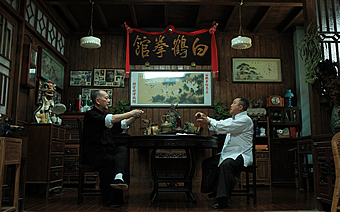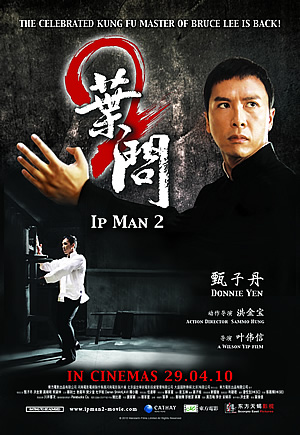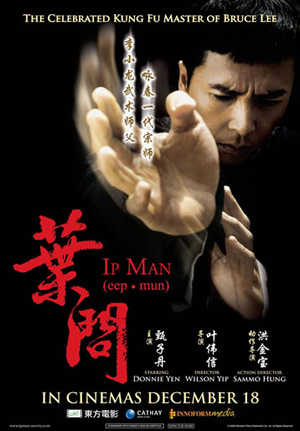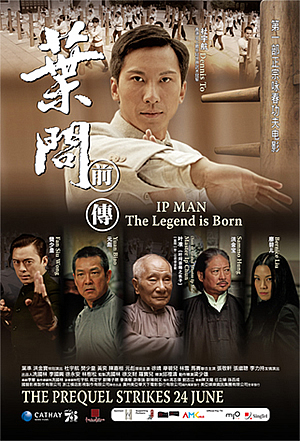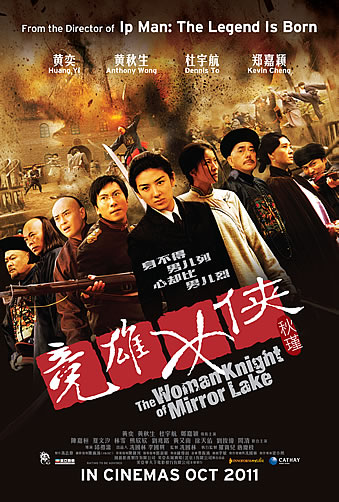IP MAN: THE FINAL FIGHT (叶问:终极一战) (2013)
Genre: Martial Arts
Director: Herman Yau
Cast: Anthony Wong, Eric Tsang, Anita Yuen, Jordan Chan, Gillian Chung, Timmy Hung, Xiong Xin Xin, Ken Low, Ip Chun
RunTime: 1 hr 41 mins
Rating: PG (Some Violence)
Released By: Shaw
Official Website:
Opening Day: 28 March 2013
Synopsis: In postwar Hong Kong, legendary Wing Chun grandmaster Ip Man is reluctantly called into action once more, when what begin as simple challenges from rival kung fu styles soon draw him into the dark and dangerous underworld of the Traids. Now, to defend life and honour, he has no choice but to fight one last time...
Movie Review:
Is it too soon for yet another story based on the life of the legendary Wing Chun grandmaster? Well, seeing as how utterly disappointing Wong Kar Wai’s version was, the answer is an empathetic yes. Here to revive hope that there is still much we have yet to see about Ip Man’s life is Herman Yau’s ‘Ip Man: The Final Fight’, a sequel of sorts to his much flashier predecessor ‘Ip Man: The Legend is Born’ that focuses on the character’s middle to later years.
Like Donnie Yen’s ‘Ip Man 2’, this one begins in 1949 as Ip Man (Anthony Wong) arrives in Hong Kong from Foshan to settle into a humble room on the roof of a three-storey shophouse. Thanks to a chance encounter with martial arts enthusiast Leung Sheung (Timmy Hung, better known as son of Sammo Hung), Ip gains a small following of working-class individuals to start a makeshift Wing Chun school without needing to go against his nature to advertise his craft.
It might seem like a motley crew – including a policeman (Jordan Chan), a seamstress and union activist (Jiang Luxia), a waitress at a dim-sum restaurant (Gillian Chung), a prison officer (Marvel Chow) and a tram driver – but there’s no denying their passion to learn, and at least at the start, how close-knit a group they make. Yet the circumstances then don’t make it any easier for Ip nor for his students, and it is from casting the fates of Ip and his disciples against a constantly evolving but always tumultuous Hong Kong in the 1950s to 1970s that Yau’s film truly comes alive.
Similarities to Alex Law’s ‘Echoes of the Rainbow’ are not unjustified, since Yau clearly evokes the same sense of nostalgia for the period during which the former was also set. Expertly weaving several disparate themes, screenwriter Erica Li deftly paints a vivid picture of a colony rocked by tensions between the unions and their companies, infighting between the various martial arts schools, corruption of the local police and most importantly, the struggle of ordinary folk to make ends meet and provide for their family.
Li draws on these real-life historical contexts to delineate the fates of Ip and his disciples, in particular that of Tang Sing (Chan) and Wong Tung (Chow). Among the disciples, Tang Sing’s character is the most fully-fleshed, depicted as a good man caught in a moral crisis between following his conscience (as Ip advises) and the temptations of power and money in his position of authority. Tang’s choice to side with the infamous kingpin named Dragon (Xiong Xin Xin) behind many of the illegal activities taking place inside the notorious Kowloon Walled City inevitably entwines Wong Tung, and by extension the entire Ip Man clan that culminates in the titular showdown.
That finale is but one of four thrilling action setpieces, and easily the most gripping and exhilarating one. First within the confines of an illegal boxing ring in a warehouse and then along the exterior windswept alley battered by the onslaught of an imminent typhoon, action choreographers Li Chung Chi and Checkley Sin let the climactic fight between Ip Man and Dragon play out – the joy here not solely being from seeing veteran martial arts actor Xiong Xin Xin show off his impressive moves, but also from how Anthony Wong’s one-year training in Wing Chun has truly paid off. Of course, that is also apparent from the earlier sequences, in particular one in which Ip Man squares off in a friendly closed-door bout with rival ‘White Crane’ master Ng Chun (comedian Eric Tsang in a fantastic cameo that shows off his agility quite certainly honed from his former days as a stuntman).
Besides demonstrating a facet of Anthony Wong’s acting repertoire that is rarely seen (fun fact – the man is a dedicated practitioner of the ‘Monkey Fist’ style), this portrayal of Ip Man also benefits from the dramatic skills of arguably one of the best actors in Hong Kong cinema today. While Tony Leung’s was just like any other of his from other Wong Kar Wai collaborations and Donnie Yen’s was probably more stagey than who Ip Man was in real life, Wong’s depiction is – we dare say – the most nuanced that captures both the man’s humble dispositions and his internal struggles.
The latter is also thanks to a multi-layered script that doesn’t just dwell on the aspects of Ip Man’s life that pertain to his martial artistry, but also his personal life in relation to his wife Yong Cheng (Anita Yuen) and his son (Mainland actor Zhang Song Wen). The first Ip Man film so far to pay due attention to what must have been one of his greatest regrets spending the large part of his postwar years apart from wife and son, it just as poignantly reveals his gentle affection for a Shanghainese songstress Jenny (Zhou Chuchu) - despite the veiled objections of his students - that again finds closure in death. Wong is absolutely brilliant in these intimate moments of Ip Man’s life, and it’s hard to imagine a more befitting actor here to play the role.
In choosing to illuminate the less ostentatious but more relatable characteristics of Ip Man’s twilight years, Yau’s film truly stands apart from the other four films that have come before it. Less concerned about the legend than the Man behind it, ‘Ip Man: The Final Fight’ is the most heartfelt one yet about him, with an assured and sensitive directorial hand from Yau guiding a well-written script and a terrific lead performance by Anthony Wong as well as fine supporting acts from Jordan Chan, Eric Tsang and Chuchu. Even though it doesn’t have Donnie Yen’s star power or the marquee names of Wong Kar Wai and Tony Leung, this is a beautiful film that offers a well-balanced perspective of Ip Man’s later years against the rich backdrop of post-World War II Hong Kong.
Whether out of coincidence or some shrewd planning is not clear, but its ending with Ip Man meeting a young, naïve and cocky Bruce Lee could not have been more appropriate. Hinting that the relationship between master and disciple isn’t as simple as one might have assumed given their differing personalities, it is a perfect scene-setter for Donnie Yen’s next take on the character, the recently announced ‘Ip Man 3’ that will delve into how Bruce Lee becomes Ip Man’s disciple. In the larger context of the Ip Man films, this is more than a worthy addition for the reasons articulated above, and a major contender for some weighty honours come awards season (Best Actor – Anthony Wong anyone?).
Movie Rating:




(More a Ip Man movie than Wong Kar Wai’s ever was, this beautifully realised portrait of the man’s later to twilight years is heartwarming, poignant and thrilling at different times, with an exceptionally nuanced performance by Anthony Wong in the titular role)
Review by Gabriel Chong
You might also like:
.jpg)
Movie Stills
